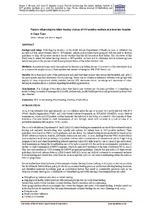Factors influencing the infant feeding choices of HIV-positive mothers at a level two hospital in Cape Town
Abstract
BACKGROUND/AIMS: Following the decision by the South African
Department of Health in 2012 to withdraw the provision of free
infant formula milk to HIV-exposed infants, policy makers have
grappled with the need to develop guidelines to help HIV-positive
mothers decide whether they should breastfeed their babies.
The objectives of this study were to assess the infant feeding
choices of HIV-positive mothers and to determine factors
influencing their behaviours prior to the process of withdrawing
the provision of free infant formula milk.
METHODS: A quantitative approach was employed in this study,
including the use of a survey to collect descriptive data on a
consecutive sample (n=100). Data analysis was carried out using
the IBM SPSS Version 20.
RESULTS: More than half (54%) of the participants indicated
that their infants were exclusively breastfed, and 46% of the
participants reported exclusively formula feeding. There was no
statistical difference between both groups with regards to: race;
employment status; obstetric history; HIV disclosure status;
knowledge and awareness of infant feeding recommendations or
policies regarding breastfeeding promotion.
CONCLUSIONS: The findings of this study show that health-care
workers are the main providers of counselling on infant feeding.
Inconsistent messages from health professionals, health facility
practices and government policies were also observed.

